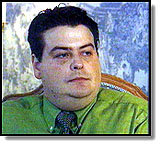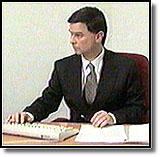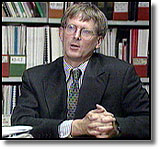
|
Police Probe MI5 Man's InterviewsPolice are investigating whether David Shayler, a former agent with the Security Service, MI5, breached the Official Secrets Act by talking to the news media about the organisation's work.The head of MI5, Stephen Lander, spent more than an hour with the Home Secretary, Jack Straw, on Wednesday morning. Mr Lander briefed Mr Straw on developments and it is understood that the two men discussed the current arrangements for Parliamentary oversight of the security service. Mr Shayler had told the BBC that, because of bureaucracy and inefficiency, MI5 had wasted a real chance to "finish off" the IRA when it was mounting a bombing campaign in England in 1993. He said he'd been told that a file was kept on the former prime minister, Sir Edward Heath, because he was keen on rapprochement with the Eastern bloc.
He had also told a Sunday newspaper that the organisation had bugged young politicians - including Mr Straw himself and two others who are also now senior members of the Government: Peter Mandelson, the Minister without Portfolio, and Harriet Harman, the Social Security Secretary. Under the 1989 Official Secrets Act it is an offence for anyone who has been a member of the Security Service to disclose sensitive information gleaned through their job without lawful authority. Ultimately it would be for the Attorney General, John Morris, to sanction any prosecution under the Act, should the police investigation produce compelling evidence of a breach. If convicted of an unauthorised disclosure, Mr Shayler could face up to two years' imprisonment, an unlimited fine or both. The civil rights group, Liberty, said Mr Shayler's continuing revelations called into question the whole existence of the Security Service.
"These examples demonstrate that MI5 hasn't been under control, under any democratic or legal controls. We have to raise questions about their existence." The Liberal Democrat MP, Alan Beith, a member of the Commons Select Committee on Intelligence and Security, said MI5 appeared to have gathered intelligence too widely, and on individuals who were not appropriate surveillance targets. But things had changed, and police forces appreciated the service's assistance. "The priorities are now quite different - fighting terrorism, drugs trafficking, counter-intelligence," he said.
Related site:
Government Central Intelligence Machinery pages
|
Diana, Princess of Wales, 1961-1997
Conference 97
Devolution
The Archive
News |
Issues |
Background |
Parties |
Analysis |
TV/Radio/Web
Interactive |
Forum |
Live |
About This Site
News |
Issues |
Background |
Parties |
Analysis |
TV/Radio/Web
Interactive |
Forum |
Live |
About This Site
© BBC 1997 |
politics97@bbc.co.uk |


